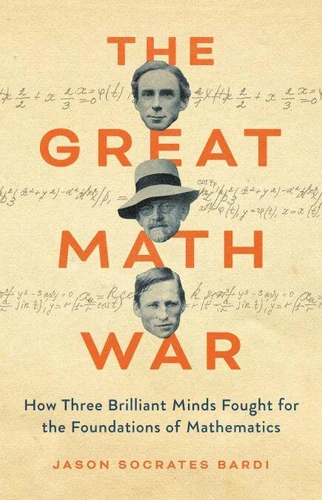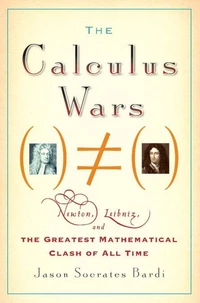Nouveauté
The Great Math War. How Three Brilliant Minds Fought for the Foundations of Mathematics
Par :Formats :
Disponible dans votre compte client Decitre ou Furet du Nord dès validation de votre commande. Le format ePub protégé est :
- Compatible avec une lecture sur My Vivlio (smartphone, tablette, ordinateur)
- Compatible avec une lecture sur liseuses Vivlio
- Pour les liseuses autres que Vivlio, vous devez utiliser le logiciel Adobe Digital Edition. Non compatible avec la lecture sur les liseuses Kindle, Remarkable et Sony
- Non compatible avec un achat hors France métropolitaine
 , qui est-ce ?
, qui est-ce ?Notre partenaire de plateforme de lecture numérique où vous retrouverez l'ensemble de vos ebooks gratuitement
Pour en savoir plus sur nos ebooks, consultez notre aide en ligne ici
- Nombre de pages384
- FormatePub
- ISBN978-1-5416-0501-5
- EAN9781541605015
- Date de parution04/11/2025
- Protection num.Adobe DRM
- Infos supplémentairesepub
- ÉditeurBasic Books
Résumé
A stirring account of the mathematicians who went looking for the bedrock philosophical foundations of their field and witnessed a house of cards collapse instead "A fascinating romp through one of the most consequential conflicts of the early 20th century."-Johnjoe McFadden, author of Life on the Edge As the nineteenth century ended, mathematicians were celebrating a century of triumphs that-surprisingly-made clear how little they knew: What is the nature of infinity? Is math free from self-contradiction? And what does math have to do with reality? This was the Foundational Crisis in mathematics.
In The Great Math War, Jason Socrates Bardi tells the story of three competing efforts by mathematicians to resolve it-and the firefight that ensued. Bertrand Russell thought we could achieve certainty if we treated math as an extension of logic. David Hilbert believed redemption lay in accepting mathematics as a formal game of arbitrary rules, no different from the moves and pieces in chess. And L.
E. J. Brouwer argued math is entirely rooted in human intuition-and that math is not based on logic but rather logic is based on math. It was a bitter struggle, intellectually and personally, as the three vied to set the course for mathematics in the twentieth century. Set against the backdrop of international warfare unfolding alongside it, The Great Math War brings the Foundational Crisis to radiant life-and shows how it indelibly shaped twentieth-century intellectual life.
In The Great Math War, Jason Socrates Bardi tells the story of three competing efforts by mathematicians to resolve it-and the firefight that ensued. Bertrand Russell thought we could achieve certainty if we treated math as an extension of logic. David Hilbert believed redemption lay in accepting mathematics as a formal game of arbitrary rules, no different from the moves and pieces in chess. And L.
E. J. Brouwer argued math is entirely rooted in human intuition-and that math is not based on logic but rather logic is based on math. It was a bitter struggle, intellectually and personally, as the three vied to set the course for mathematics in the twentieth century. Set against the backdrop of international warfare unfolding alongside it, The Great Math War brings the Foundational Crisis to radiant life-and shows how it indelibly shaped twentieth-century intellectual life.
A stirring account of the mathematicians who went looking for the bedrock philosophical foundations of their field and witnessed a house of cards collapse instead "A fascinating romp through one of the most consequential conflicts of the early 20th century."-Johnjoe McFadden, author of Life on the Edge As the nineteenth century ended, mathematicians were celebrating a century of triumphs that-surprisingly-made clear how little they knew: What is the nature of infinity? Is math free from self-contradiction? And what does math have to do with reality? This was the Foundational Crisis in mathematics.
In The Great Math War, Jason Socrates Bardi tells the story of three competing efforts by mathematicians to resolve it-and the firefight that ensued. Bertrand Russell thought we could achieve certainty if we treated math as an extension of logic. David Hilbert believed redemption lay in accepting mathematics as a formal game of arbitrary rules, no different from the moves and pieces in chess. And L.
E. J. Brouwer argued math is entirely rooted in human intuition-and that math is not based on logic but rather logic is based on math. It was a bitter struggle, intellectually and personally, as the three vied to set the course for mathematics in the twentieth century. Set against the backdrop of international warfare unfolding alongside it, The Great Math War brings the Foundational Crisis to radiant life-and shows how it indelibly shaped twentieth-century intellectual life.
In The Great Math War, Jason Socrates Bardi tells the story of three competing efforts by mathematicians to resolve it-and the firefight that ensued. Bertrand Russell thought we could achieve certainty if we treated math as an extension of logic. David Hilbert believed redemption lay in accepting mathematics as a formal game of arbitrary rules, no different from the moves and pieces in chess. And L.
E. J. Brouwer argued math is entirely rooted in human intuition-and that math is not based on logic but rather logic is based on math. It was a bitter struggle, intellectually and personally, as the three vied to set the course for mathematics in the twentieth century. Set against the backdrop of international warfare unfolding alongside it, The Great Math War brings the Foundational Crisis to radiant life-and shows how it indelibly shaped twentieth-century intellectual life.




